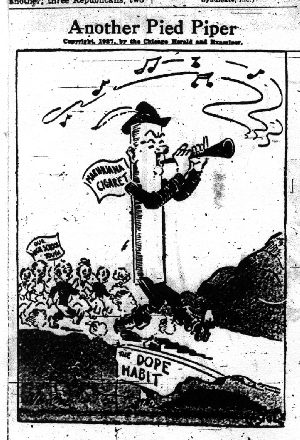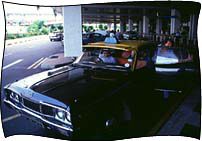 Singapore has a Public Transport Council (PTC) in place of Adam Smith's Invisible Hand of the Free Markets. This is as much as an admission that Singapore's public transportation does not operate under any free market framework at all. It must take an 'authority', duly constituted by the government and empowered by Parliament, to regulate the public transport market in Singapore. Clearly, the invisible hand is too scary to 'manipulate' compared to a visible one.
Singapore has a Public Transport Council (PTC) in place of Adam Smith's Invisible Hand of the Free Markets. This is as much as an admission that Singapore's public transportation does not operate under any free market framework at all. It must take an 'authority', duly constituted by the government and empowered by Parliament, to regulate the public transport market in Singapore. Clearly, the invisible hand is too scary to 'manipulate' compared to a visible one.Under newfound teeth due to the PTC Act of April 2006, it is now able to flex its muscles to get the public transport operators to ship up or be fined tens of thousands of dollars. On the face of it, this is good news for commuters, especially those that depend on the trains and buses everyday travelling to and from work. Surely now transport operators will be more careful that their buses and trains run on time, and that there will not be any breakdown in services - at least not as serious as the one that happened to SBS Transit's NEL subway line last Monday, 24 July 2006. Less waiting time and more predictable services will reduce the stress that workers already suffer from in the office.
But who really foots those multi-thousand dollar fines should the transport company be found wanting? You guessed right - the commuters. First, transport companies must now put in place a greater level of control and monitoring infrastructure to ensure that they do not slip up. That means more manpower, and probably more sophisticated software and hardware systems that may cost hundreds-of-thousands of dollars for a start, not counting long term maintenance costs. Second, the transport companies may have to increase redundancies (e.g. more idle buses and train cars) so that they can react and recover from emergencies quickly, as required by the PTC. Third, they will probably need to buy more insurance to buffer any huge expenses that might be imposed in the event that they do get fined, in spite of all the millions already spent. All these translates into higher operating costs which, ironically, our transport companies have often submitted to the PTC as a basis to justify increasing their fares. This is an expensive merry-go-round for consumers.
So, does penalising transport companies really benefit the commuters? I am rather doubtful. Unless disruptions to transport services is blatantly negligent, I think the PTC should just leave the transport companies alone. Singapore commuters are a rather spoilt lot. One major disruption in 4 years of NEL's operations is nothing to be alarmed about. Transport companies will take the lessons to heart and rectify the situation without prompting. To start imposing punitive fines here and there will only hurt the commuters' pockets in the long run.
While it is a good thing (in the absence of true competition and a free transport market) that the PTC now has greater powers, it should exercise its powers judiciously and not inadvertently hurt the commuters it is tasked to protect. The best and most effective power that disciplines still is free competition.
 Over the last week or so, several Today readers have written to express their views on road safety for cyclists on Singapore's roads. Not that Singapore's road are badly constructed with potholes all over the place. It isn't even because Singapore's roads are not well designed and well connected around the island. In fact, the government departments in charge of roads and parks have gone out of their way to build park connectors that will link all the public parks on the island so that one can cycle from park to park around the island with little disruption. Unfortunately, for reasons unknown to me, nobody has come up with a Park Connector Marathon for cyclers - a Tour de Singapore - yet. It would be very exciting for me and many cycling enthusiasts if this were to happen. It would be great exercise for cyclists and a fun day in the sun for spectators and family who, more often than not, are cooped up either in their apartments, their neighbourhood supermarkets, the malls or their offices for much of the day.
Over the last week or so, several Today readers have written to express their views on road safety for cyclists on Singapore's roads. Not that Singapore's road are badly constructed with potholes all over the place. It isn't even because Singapore's roads are not well designed and well connected around the island. In fact, the government departments in charge of roads and parks have gone out of their way to build park connectors that will link all the public parks on the island so that one can cycle from park to park around the island with little disruption. Unfortunately, for reasons unknown to me, nobody has come up with a Park Connector Marathon for cyclers - a Tour de Singapore - yet. It would be very exciting for me and many cycling enthusiasts if this were to happen. It would be great exercise for cyclists and a fun day in the sun for spectators and family who, more often than not, are cooped up either in their apartments, their neighbourhood supermarkets, the malls or their offices for much of the day. Peak hour surcharge, surcharge for taking a taxi at Changi Airport and Singapore Expo (and God knows where else), midnight surcharge, ERP surcharges, taxi booking surcharge, and God knows what else will be invented. Now Singapore is not only known as a Fine city, it will also gain a reputation as a Surcharge city, going by the half a million tourists expected every year.
Peak hour surcharge, surcharge for taking a taxi at Changi Airport and Singapore Expo (and God knows where else), midnight surcharge, ERP surcharges, taxi booking surcharge, and God knows what else will be invented. Now Singapore is not only known as a Fine city, it will also gain a reputation as a Surcharge city, going by the half a million tourists expected every year. Let me be frank. People who obtained free National Day Parade (NDP) tickets should be free to sell them. There is nothing wrong about it and should they turn a profit from it, that's their gain through their enterprise. Sure, some would say that it is a riskless enterprise, but then, some enterprises are riskless, though not long lasting nor self-propagating in the long run. A person is duly rewarded when he is quick enough to identify an opportunity, learns how to use a service such as eBay and takes the necessary action to cash in on the opportunity. Do you think learning how to use eBay is costless? The time and trouble learning to use eBay should be rewarded.
Let me be frank. People who obtained free National Day Parade (NDP) tickets should be free to sell them. There is nothing wrong about it and should they turn a profit from it, that's their gain through their enterprise. Sure, some would say that it is a riskless enterprise, but then, some enterprises are riskless, though not long lasting nor self-propagating in the long run. A person is duly rewarded when he is quick enough to identify an opportunity, learns how to use a service such as eBay and takes the necessary action to cash in on the opportunity. Do you think learning how to use eBay is costless? The time and trouble learning to use eBay should be rewarded. Nothing much has changed with the news media organisations in Singapore, which is dominated by SPH and Mediacorp. SPH owns has the largest print publications on the island, with the Straits Times as its anchor paper. Mediacorp owns the free Today tabloid and the broadcast media, including Channel News Asia. In spite of the growth in the news media in the past few years, one thing remains the same - no news article can be critical of the Singapore government, after discounting those that it sanctions.
Nothing much has changed with the news media organisations in Singapore, which is dominated by SPH and Mediacorp. SPH owns has the largest print publications on the island, with the Straits Times as its anchor paper. Mediacorp owns the free Today tabloid and the broadcast media, including Channel News Asia. In spite of the growth in the news media in the past few years, one thing remains the same - no news article can be critical of the Singapore government, after discounting those that it sanctions. First, there was a strong rebuttal to mr brown's regualar Friday opinion column published on 30th June 2006 in the
First, there was a strong rebuttal to mr brown's regualar Friday opinion column published on 30th June 2006 in the  Nothing is certain in life, they say, except death and taxes. Well, in Singapore, there's one more - Taxi fare increases. As many have expected, the prices of many essential items are going up. Some are naughty enough to link this chronologically to the last General Elections. Well, there is another reason for these prices increases (including electricity tariffs), and that is the increase in the price of oil. Still, many people will be unhappy about the increases in tranportation costs, though I venture that they are less unhappy when electricity tariffs are increased.
Nothing is certain in life, they say, except death and taxes. Well, in Singapore, there's one more - Taxi fare increases. As many have expected, the prices of many essential items are going up. Some are naughty enough to link this chronologically to the last General Elections. Well, there is another reason for these prices increases (including electricity tariffs), and that is the increase in the price of oil. Still, many people will be unhappy about the increases in tranportation costs, though I venture that they are less unhappy when electricity tariffs are increased. Despite all talk to the contrary, the PAP has yet to make any real change in it domestic policies regarding lift upgrading works. Opposition MP, Mr Chiam See Tong reportedly asked for $80m, which was part of the the promised package of benefits that the PAP candidate for Potong Pasir, Mr Sitoh Yipin, said he would deliver if he won. Well, he lost, but still, a significant 44% of the electorate in Potong Pasir voted for him. That's almost 1 in 2 people who desire the PAP's package.
Despite all talk to the contrary, the PAP has yet to make any real change in it domestic policies regarding lift upgrading works. Opposition MP, Mr Chiam See Tong reportedly asked for $80m, which was part of the the promised package of benefits that the PAP candidate for Potong Pasir, Mr Sitoh Yipin, said he would deliver if he won. Well, he lost, but still, a significant 44% of the electorate in Potong Pasir voted for him. That's almost 1 in 2 people who desire the PAP's package. Some foreigners gush that Singapore's transport system is one of the best in the world. To them, it simply works. But to some other foreigners who have lived or worked in Singapore, the taxi service leaves much to be desired. This was highlighted in some newspapers reports recently.
Some foreigners gush that Singapore's transport system is one of the best in the world. To them, it simply works. But to some other foreigners who have lived or worked in Singapore, the taxi service leaves much to be desired. This was highlighted in some newspapers reports recently.